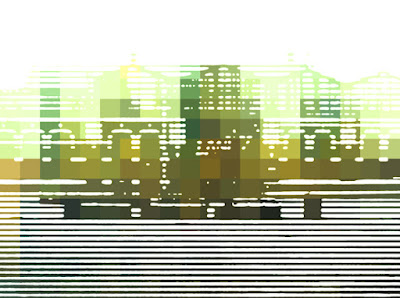 |
| 'The Castle/Le Grand Hotel 4', Acrylics, Paint Pen, Paper Collage, Ink, Watercolour, French Polish, Spray Enamel on Panel, 60 cm x 60 cm, 2023 |
The focus shifts back to my own East Midlands back yard once again. This is the most-recently completed of what I currently regard as my ‘Great Central’ pieces. That’s just a working title really (nominally indicating the small parcel of territory under consideration) - which is perhaps reflective of my current attempts to work in a more fluid, non-committal or less compartmentalised way.
Discretely labelled sub-series have already emerged under this umbrella, but the seepage of themes and motifs between them is considerable. Connections and layered narratives coalesce in a hopefully more rhizomorphic fashion (in the Deluzian sense), and while certain geographical/mental cartographies are both delineated and pinned - I reserve the right to take any unfamiliar diversion, be it through space or time (observed or imagined), as intuition dictates. This naturally renders any attempt at linear or coherent analysis pretty difficult. One plus-point of this change of orientation (in my mind - at least), is a side-stepping of customary attempts to over-explain things to both myself and others, down the years. Stylistic tropes and subject categories may still appear reasonably familiar, but I genuinely believe that the underlying logics in the work are a little more organically cultivated nowadays. It’s no coincidence that this is the first time I’ve showcased one of these pieces alongside anything other than a wilfully obscure fragment of 'experimental' text. I only do so now as I’m a bit between such ‘bits’, and these pics have been waiting around for a little while.
Anyway, for what it’s worth - the imagery here may or may not relate to:
- A complex of local hotel and office buildings, erected as part of the redevelopment of a significant tract of central Leicester, viewed across the river Soar and an intervening construction site (sometime in 2021).
- The vaguely similar architectural massing of Prague’s Castle complex, viewed across the river Vltava (sometime in the 1990s, whilst on a somewhat intoxicated holiday of my own).
- Kafka’s great, unfinished novel (important – that), ‘The Castle’, with its deeply unsettling account of a stranger profoundly lost in an unfamiliar land. [1.]
- Marcel Proust’s unreliable memories of teenage holidays spent at Le Grand-Hotel in Balbec/Combray, and his (highly subjective – possibly delusional) attempts to become reconciled with a lost personal history. [2.]
- The printed pages and digital frames of mediation/mapping which might allow us to travel through space and time, in order to unlock any of these spaces at will, and in any chosen configuration.
- The nature of mediation, and the (welcome) unexpected resonances which may occur when a narrative or image is misunderstood, misheard, or unsatisfactorily resolved.
- The sheer coincidence of simply reading a certain text (possibly on a whim), at the time a particular photograph or painting is being made.
There’s plenty to un-pick there, so hopefully, it’s enough to be going on with…



















































